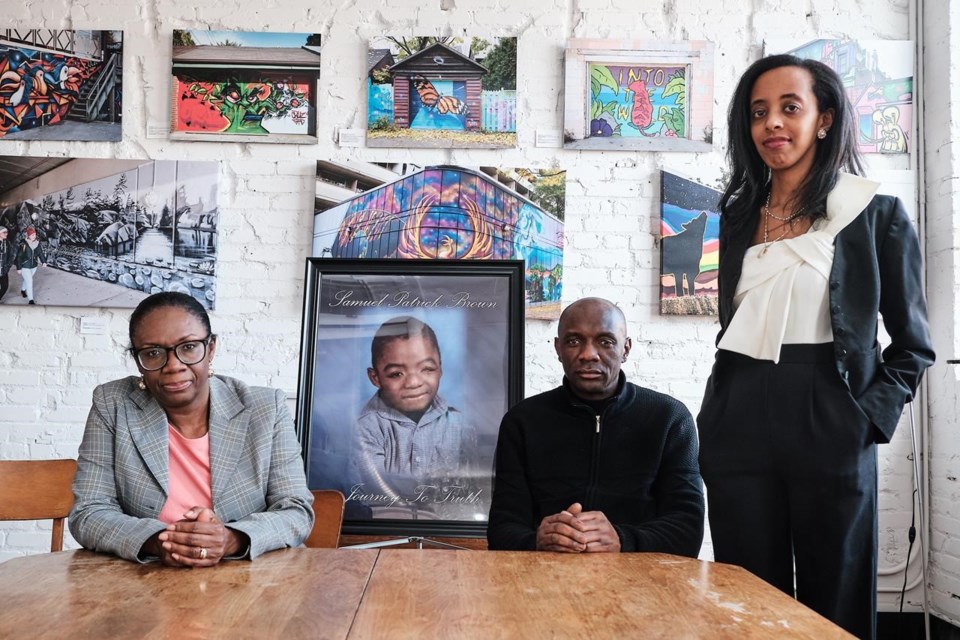TORONTO — In the aftermath of Samuel Brown's sudden death, a coroner said an autopsy wasn't necessary for the Ontario teen because he had disabilities, his mother told jurors at an inquest that began Monday.
Despite only 12 hours passing between the family getting a call from the school for blind children Brown attended, indicating he was slightly unwell, and the teen being pronounced dead in hospital, Andrea Brown said she and her husband were told to consider their son's disabilities.
"(The coroner) said 'We don’t have to do an autopsy,’ and I said ‘Pardon me.’ He said, ‘You don’t have to do an autopsy because he was born with a chromosome deletion," Brown said, fighting back tears.
"The coroner said ... I must remember that he was a kid with a disability. I said 'Yes, I remember that because I was the one who gave birth to him.'"
Samuel Brown, who was born with a genetic condition that left him blind, deaf and non-verbal, died five years ago at the age of 18 while attending the W. Ross Macdonald School for the Blind in Brantford, Ont.
His family has said he was in good health the weekend before he died and have said medical officials reached conflicting conclusions about his cause of death.
The inquest that began Monday will examine the circumstances around Brown's death, look at the heightened risks he faced when it came to food and liquid entering his airway, explore safeguards to respond to those risks and analyze the school's policies for students with barriers to communicating their needs and symptoms.
Brown began attending W. Ross Macdonald, the province's only dedicated school for the blind and deafblind, at the age of four and experienced no problems for most of his tenure, other than occasional visits to the hospital for minor illnesses while lodging there during the week, the inquest heard.
Andrea Brown said she heard no reports of illness until the evening of Feb. 8, 2018, when a staff member called to say her son was "a bit fussy" and unwilling to get up for dinner. The lack of urgency in the caller's voice indicated to her that the situation was not a major concern, she testified.
The next morning, she received another call that her son had been taken to hospital because he was unresponsive. It wasn't until the parents got to the hospital themselves that they learned their son had died, she said.
The Browns said the investigating coroner produced a report saying their son had died of natural causes.
In an attempt to get more answers, the family pushed for an autopsy, which was eventually carried out and concluded that Samuel Brown died of pneumonia – a finding his mother said only deepened the family's confusion.
Inquest counsel Maria Stevens said an area the inquest will explore is how cause of death statements are framed when disability is a factor.
Andrea Brown also told the inquest about an ambulance call report, which will be examined in more detail later in the inquest, that stated school staff were doing hourly checks on Samuel the night before he died because he was reported to have "laboured breathing" and was "sick and lethargic" all evening.
She said she was not told of those details that night, despite calling and leaving a voice message that went unanswered.
She stressed that Samuel's disabilities and medical conditions did not prevent him from living a full, happy life and being loved by the community around him.
Sometimes, she said, Samuel would just sit, cross his legs and laugh and smile "enjoying every minute."
"Samuel taught you how to love, how to care, how to be patient ... Samuel was a teacher in his own ways of not speaking or (being) visually blind or not hearing," she said. "He had his whole future in front of him."
The inquest is expected to hear from a number of witnesses over 10 days, including school staff, the pathologist who conducted a post-mortem examination of his body and an expert on medical ableism.
This report by The Canadian Press was first published Aug. 28, 2023.
Tyler Griffin, The Canadian Press




